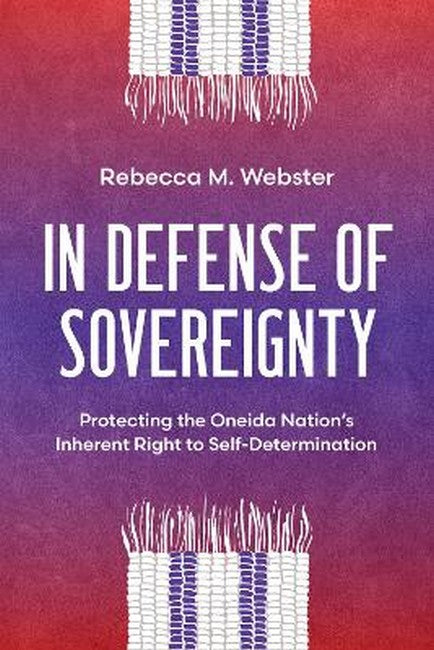Rebecca M. Webster, an associate professor in the American Indian studies department at the University of Minnesota, Duluth, is a former senior staff attorney for the Oneida Nation. She is the author of Our Precious Corn: YukwanEnste and the coeditor of Tribal Administration Handbook, and her articles can be found in American Indian Quarterly, Planning Theory & Practice, Wisconsin Lawyer, Ethnohistory, and the Journal of American Indian Education.
Request Academic Copy
Please copy the ISBN for submitting review copy form
Description
List of Illustrations Foreword by Richard Monette Preface Introduction: This Will Be Our Legacy Rebecca M. Webster 1 The Oneida Nation of Wisconsin and the Oneida Indian Reservation, 1821-1880 James W. Oberly 2 From Allotment to the Indian New Deal, 1887-1934 Frederick E. Hoxie 3 Evolution of a Nation William Gollnick 4 Condemnation: Resisting Development on Nation-Owned Land Rebecca M. Webster 5 Dispatching the Police: Brown County and Oneida Nation Intergovernmental Agreement Rebecca M. Webster 6 Overcoming Restrictive Covenants to Reacquire Reservation Land Rebecca M. Webster 7 Stormwater Taxes: "Anyway There Are No Tribal Debts to Hobart" Rebecca M. Webster 8 The Big Apple Fest Case: The Village of Hobart's Failed Attempt to Put an End to the Oneida Reservation and Obtain Control over the Oneida Nation James R. Bittorf and Arlinda F. Locklear 9 Rebuilding the Nation's Land Base, One Fee-to-Trust Application at a Time Rebecca M. Webster Conclusion: "Dear Sir: I Am an Oneida Indian Living on the Reservation" Rebecca M. Webster Glossary of Key Terms Notes Index
"This singular volume illustrates the conflicts most Indigenous nations have had with the governments of this country. Webster offers clear and formidable arguments for the inherent rights of all Native nations to life, self-governance, safety, and sovereignty."-Ms. Magazine "Tells a story of resilience that will resonate with many audiences and should be widely read. . . . The book is a tool to communicate knowledge and experience to the next generation of Indigenous leaders and tribal advocates, and belongs in every collection."-Choice "This valuable book lays out the features of a legal and political strategy to defend a reservation-boundaries case. This material is very readable, even thrilling in places where tribal citizens detail their ongoing, real-world struggles with the Village of Hobart. Successful and compelling."-Matthew L. M. Fletcher, author of Ghost Road: Anishinaabe Responses to Indian Hating "In Defense of Sovereignty is the story of what happens when racially tinged rhetoric and litigation becomes costly intergovernmental tension that lasts for decades. Dr. Rebecca Webster, a former tribal attorney, tells a compelling story that should be required reading for every politician whose municipality interacts with Native nations."-Patty Loew, author of Indian Nations of Wisconsin: Histories of Endurance and Renewal "A compelling account of the Oneida Nation's struggle to retain its sovereignty and its reservation lands. This book describes jurisdictional battles that Indian nations in the United States are continually confronted with and provides helpful instruction on how these nations can work on a government-to-government basis with their neighbors. It offers hope that Indian nations can preserve their cultural and political integrity and continue to prosper and thrive."-Kent McNeil, author of Flawed Precedent: The "St. Catherine's" Case and Aboriginal Title "An intimate and informative account of the Oneida Nation of Wisconsin. There are two major themes: the Oneidas' complex history and their modern efforts to regain sovereignty. After migrating from New York in the 1820s, the Oneidas faced an unusually complex struggle for treaty land. Later they were harsh victims of the government's allotment laws, the worst policy Congress imposed on tribes. The book's modern parts detail legal struggles against the state municipal government that covers half the Oneida Reservation."-Richard Collins, University of Colorado "An extraordinary and seminal work of impeccable scholarship. . . . Absolutely essential and unreservedly recommended."-Midwest Book Review

